#Scientific Inquiry
Explore tagged Tumblr posts
Text
Writing Notes: Scientific Inquiry

Scientific Inquiry - a form of problem-solving and questioning that helps people come to a greater understanding of observable phenomena.
An understanding of this style of scientific reasoning forms the basis upon which the nature of science itself rests.
Once you become familiar with scientific inquiry, you can use it for specifically science-related study or as just one additional tool in your arsenal of critical thinking skills.
Core Elements of the Scientific Inquiry Process
From encouraging scientific questions to facilitating well-reasoned conclusions, the scientific inquiry process helps illuminate our understanding of the world. Here are 7 core elements to the scientific inquiry process:
Asking constant questions: At the center of both the scientific method and general scientific inquiry lies the ability to ask questions well. Make observations about a particularly interesting phenomenon and then pose questions about why such a thing happens. Let preexisting scientific theories guide your questioning, but keep in mind every theory continues to be just that—a theory—until scientific inquiry definitively proves or disproves it.
Testing your inferences: Scientific progress hinges on your ability to experiment and test inferences about evidence. To do so, you need to set up an independent variable (something you will use to test) and a dependent variable (the thing or things you are testing). Seeing how well your inferences or predictions match up with the reality of a given experiment is essential to scientific inquiry.
Making connections: As you make observations about a specific phenomenon, make connections with every other relevant topic you can remember from your past science lessons or research. Scientific knowledge is as much a result of old realizations as it is of new discoveries.
Seeking evidence: As you seek to understand the natural world, there’s no substitute for hard evidence. Collect data and gather evidence relentlessly throughout your scientific investigations. The more evidence you have to answer your initial questions, the more ironclad your ultimate case will be when you draw conclusions.
Classifying data correctly: Science is as much a process of data collection and classification as it is of asking and answering questions. This means knowing how to elucidate or graph out your discoveries in a way other people can understand. It also means using citations from other scientific journals and texts to bolster your ultimate argument as to why a particular phenomenon occurs.
Drawing conclusions: Eventually, you need to draw conclusions from the data you collect. After you’ve made an exhaustive study of your specific focus, use inductive reasoning to make sense of all the new evidence you’ve gathered. Scientific ideas are always malleable and never completely concrete—alternative explanations are always possible, and new evidence should lead to new questions and conclusions.
Sharing findings: Science is an innately group-centered discipline. The more people interpret data, the better chance there is to ensure there are no loopholes in new research. No one person’s understanding of science content is infinite, so it’s important to let other qualified people ask questions of your conclusions. Natural science is more of a never-ending collaborative process than one with a concrete point of termination.
Teaching science means ensuring learners understand how to conduct qualitative and inquiry-based learning.
Science teachers must utilize a pedagogy that foregrounds hypothesizing, experimenting, and drawing on other scientific knowledge in both theoretical and practical ways.
Educational research indicates that it can help students see the correlation between scientific inquiry and everyday life, whether in elementary school or high school.
This sort of analogization helps people understand that a scientific frame of thinking is quite intuitive when you observe it within more commonplace parameters.
As a simplistic example, imagine a student has a hard time understanding the effect of heat as an abstract force.
Allowing them to observe the degree to which bread burns at different temperatures in a toaster would help make the point clear in a more hands-on way.
Source ⚜ More: Notes & References ⚜ Writing Resources PDFs
#scientific inquiry#research#studyblr#writeblr#dark academia#writing reference#science#writers on tumblr#spilled ink#writing prompt#creative writing#writing inspiration#writing ideas#writing notes#light academia#writing resources
71 notes
·
View notes
Text

Foundations in Flux: Rethinking Quantum Mechanics
At the forefront of modern scientific inquiry lies the intriguing convergence of philosophy and physics, particularly within the realm of quantum mechanics. A discourse with Professor Jacob Barandes, a scholar bridging fundamental physics and philosophical introspection, offers a nuanced exploration of this intersection.
Challenging the orthodox view, Professor Barandes posits wave functions as mathematical constructs generating probabilities, rather than physical entities inhabiting space. This paradigm shift underscores the notion that quantum mechanics' peculiarities may originate from its representational framework, rather than the intrinsic nature of physical systems. By demoting wave functions from ontological status to epistemological utility, we may uncover a more parsimonious explanation for quantum phenomena.
The introduction of C*-algebras as an alternative, mathematically equivalent formulation, prompts a reassessment of Hilbert spaces' foundational role. This approach, highlighting the potential redundancy of Hilbert spaces in certain quantum systems, invites a critical examination of quantum mechanics' axiomatic underpinnings. The implications are far-reaching, suggesting that a reevaluation of quantum theory's foundations may yield novel insights into the nature of reality.
Eugene Wigner's thought-provoking experiment serves as a catalyst for exploring the intricate dance between consciousness, wave function collapse, and the observer's role. By interrogating the fundamental status of wave functions and Hilbert spaces, Professor Barandes' framework may provide a novel lens through which to resolve the measurement problem, thereby illuminating the complex interplay between observation, reality, and the quantum realm.
Professor Barandes' "deflationary" approach, seeking to clarify quantum mechanics by positing a more intuitive, classical-like ontology, warrants careful consideration. By modeling quantum systems as probabilistic, classical entities governed by indivisible stochastic processes, this perspective potentially reconciles the theory's interpretational ambiguities. However, the success of this endeavor hinges on its capacity to generate empirically distinguishable predictions, thus necessitating rigorous experimental verification.
Jacob Barandes: There's No Wave Function? (Curt Jaimungal, Theories of Everything, November 2024)
youtube
Thursday, November 14, 2024
#philosophy of physics#quantum mechanics#interdisciplinary studies#science and philosophy#theoretical physics#academic research#scientific inquiry#philosophical perspectives on science#interview#ai assisted writing#machine art#Youtube
10 notes
·
View notes
Text
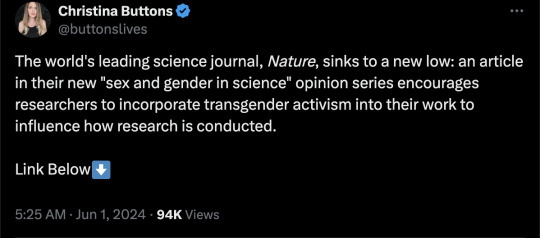
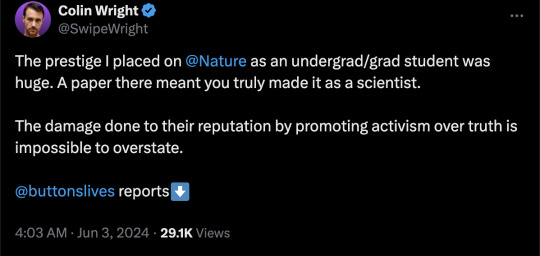
By: Christina Buttons
Published: May 31, 2024
The prominent science journal Nature has launched a new opinion article series on sex and gender. One paper in this series explores research attempting to search for a biological basis for trans-identity, arguing that such research could “pathologize” and “harm” the trans community. The authors discourage “investigations into the underlying bases of transgender identity” and propose various steps for researchers to incorporate transgender activism into their work to influence research outcomes — signaling the end of Nature’s commitment to pursuing scientific truth over ideology.
The article starts by reviewing neuroscientific studies aimed at finding the cause of trans-identity in the brain, identifying 83 papers from 1991-2024. It highlights the transgender brain-sex hypothesis, which suggests that trans-identified people have brain regions resembling those of the opposite sex. However, it neglects to mention that this hypothesis falls apart because the studies did not control for confounding variables such as sexual orientation.
The article does acknowledge that “the results of these analyses have been inconsistent.” Yet, when the media covers these studies, the public is often informed by headlines such as “transgender people are born that way,” “science proves trans people aren’t making it up,” and “attacks on trans people are also attacks on science itself.” You can read a simplified explainer I wrote debunking the brain-sex studies here.
The authors move on to the more plausible “own-body perception” theory, which proposes that reduced structural and functional connectivity between certain brain networks is responsible for gender dysphoria. However, these studies do not show a causal link, only an association. Abnormalities in body perception networks in the brain are also associated with many other conditions, including body dysmorphic disorder, anorexia, body integrity identity disorder, schizophrenia, and autism.
After reviewing the neuroscientific studies, the article’s language shifts into typical activist rhetoric, claiming that research into transgender identity can be “harmful.” The authors argue that if brain scans or some other objective test could assess whether someone is experiencing gender dysphoria, it could be used to prevent people from accessing cross-sex hormones and surgeries if they are not deemed “eligible.”
"A second possibility is that neuroscientific findings related to transgender identity will fuel transphobic narratives," the authors write, citing a “feminist perspective” social science journal article on "Transprejudice."
For example, they state, "Some people argue that allowing transgender women to access infrastructure, such as public toilets or women’s prisons, threatens the safety of 'real women'." It is odd and audacious for a serious science publication to use "real women" in quotations. Moreover, their source for this claim is an article about Kathleen Stock, who does not argue that transgender women threaten the safety of biological women. In fact, she explicitly states the opposite: "I am definitely not saying that trans women are particularly dangerous – they are definitely not."
The authors also take a dig at sexologist Ray Blanchard, claiming that autogynephilia “hasn’t held up to scientific scrutiny,” citing a "feminist analysis" paper by a trans activist. Apparently, they haven't spent any time on trans Reddit, where they would encounter a vast discourse on "gender euphoria boners."


The authors end by setting “four actions” for researchers studying transgender people to prevent further “harm” from being done. They suggest researchers set up an advisory board and multidisciplinary teams consisting of transgender people to consult on their study designs and “prevent the outcomes of neuroscientific and other studies from being described and published in an overly deterministic and simplistic way.” They also dictate what should and should not be studied, suggesting researchers "prioritize research that is likely to improve people’s lives" rather than searching for the cause of trans-identity.
The final suggestion is to “rethink how ethical approval is obtained,” which relates to an example they provided of a 2021 UCLA study that was suspended after significant backlash from transgender activists. The study aimed to examine the brains of trans-identified individuals by showing them images of themselves wearing tight clothes, intending to trigger gender dysphoria. Although the study obtained ethical approval from their research institute and the transgender participants provided informed consent, it seems they weren't the right transgender people to ask permission from. Their suggestion implies that researchers must obtain approval for their studies from transgender activists.
The authors seem aware of the implications of their recommendations, as they conclude their article by admitting their approach would limit scientific inquiry:
“Our aim is not to halt scientific enquiry. But when it comes to transgender identity, knowledge cannot be pursued in isolation from the many societal factors that shape how that knowledge is received and acted on.”
This statement translates to prioritizing activism over truth-seeking when the findings might be inconvenient or misaligned with political narratives and activist goals. Such a stance compromises the integrity and credibility of science, reducing it to a tool for activism rather than a means of uncovering and understanding reality.
It is disheartening to watch one of the world’s most prestigious scientific journals compromise their credibility by continuing to prioritize ideology over truth.
Besides, the authors' concerns about discovering a biological cause for trans-identity are misplaced. While there are biological traits associated with being transgender, such as same-sex attraction and gender nonconformity, “transgender” itself does not appear to be an inherent condition one can be born with. The concept of "transgender," as understood in Western cultures, is a cultural construct that doesn't have a direct equivalent in many non-Western societies.
Research into a cause for gender dysphoria would be difficult because the transgender population has become so heterogeneous. Even if one were predisposed to a psychiatric condition like gender dysphoria, predispositions are not predeterminations of a transgender outcome. The notion of transgender identities being fixed at birth is further contested by the increasing number of detransitioners and extensive research on desistance among children, suggesting that such identities can often be temporary coping mechanisms for young people in distress.
==
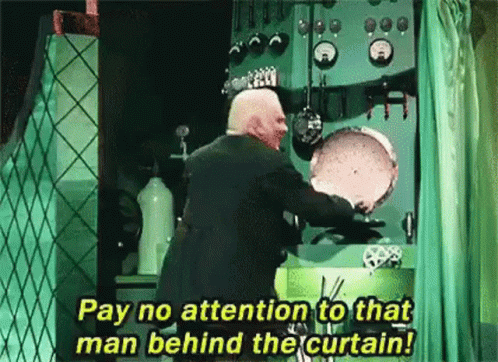
We're just supposed to accept that hacking off body parts and giving life-altering drugs and hormones is a completely normal part of life. And that wondering where this is all coming from, what's underlying it is the problematic part.
At its core, the point of this ideology is to pathologize the completely normal and normalize the pathological.
Carl Sagan warned us about this:
"The truth may be puzzling. It may take some work to grapple with. It may be counterintuitive. It may contradict deeply held prejudices. It may not be consonant with what we desperately want to be true. But our preferences do not determine what's true." ― Carl Sagan
Reality is not obliged to conform to people's wishes or preferences, and we are not obligated to lie or consign ourselves to ignorance in order to placate those wishes and preferences. We don't allow "if you find out what's true, it'll hurt our feelings" - i.e. blasphemy - for the religious. Why are we allowing genderist fanatics to get away with it, when it's still just an accusation of blasphemy?
When people say, "you're not allowed to go looking over here, it's a moral failing to do so," the correct response is to go, "now I want to go look over there even more."
-
"Sex is real... But the belief that we have a moral duty to accept reality just because it is real is, I think, a fine definition of nihilism." ― Andrea Long Chu, gender cultist and lunatic
“The facts may tell you one thing. But, God is not limited by the facts. Choose faith in spite of the facts.” ― Joel Osteen, religious nutcase and lunatic
#Christina Buttons#Nature#Nature magazine#ideological corruption#science denial#blasphemy#corruption of science#scientific inquiry#gender ideology#gender identity ideology#queer theory#intersectional feminism#religion is a mental illness
14 notes
·
View notes
Text
The Philosophy of Enlightenment
The philosophy of Enlightenment refers to an intellectual movement in 17th and 18th-century Europe that emphasized reason, science, individualism, and the pursuit of knowledge as the means to challenge traditional authority and improve society. The Enlightenment thinkers, known as “philosophes,” believed in the capacity of human reason to understand and reshape the natural world, human behavior, and social structures, seeking to cultivate human rights, progress, and freedom.
Key Concepts in Enlightenment Philosophy
Reason and Rationality: Enlightenment thinkers believed that human reason could understand the universe and uncover truths about nature, humanity, and society. Rational inquiry and empirical evidence became central to developing knowledge, opposing the uncritical acceptance of tradition, superstition, and dogma.
Scientific Inquiry: The Enlightenment emphasized the scientific method, which applied empirical observation, experimentation, and analysis to uncover natural laws. Influenced by figures like Isaac Newton, Enlightenment thinkers saw science as a tool to demystify the universe and unlock practical knowledge for human betterment.
Human Rights and Individual Freedom: Philosophers like John Locke and Jean-Jacques Rousseau argued that individuals have inalienable rights, including life, liberty, and property. They advocated for a society where government derives its authority from the consent of the governed, promoting individual freedom as essential to a just society.
Secularism and Skepticism of Authority: Enlightenment philosophy sought to separate church and state, emphasizing secular governance and questioning religious authority. Philosophers like Voltaire and David Hume criticized organized religion’s influence over politics and its discouragement of independent thought.
Progress and Perfectibility: Enlightenment thinkers believed that humans and societies were capable of continuous improvement. They emphasized education, social reform, and moral development, seeing each as pathways toward a more just, knowledgeable, and equitable society.
Social Contract: Building on ideas of individual rights and justice, thinkers like Thomas Hobbes, John Locke, and Jean-Jacques Rousseau developed theories of the social contract. This theory posits that people consent, either explicitly or implicitly, to form governments that protect their rights in exchange for certain responsibilities, providing a framework for democratic governance.
Equality and Democracy: Many Enlightenment thinkers advocated for greater equality and democratic ideals. Rousseau, for instance, emphasized that legitimate government represents the “general will” of the people, an idea foundational to modern democracy. Thinkers promoted the idea that social and political structures should not be based on birth or privilege but on merit and rational principles.
Prominent Figures and Their Contributions
Immanuel Kant: Known for his essay "What Is Enlightenment?" Kant argued that enlightenment is the process of an individual’s release from self-imposed intellectual immaturity, encouraging people to "dare to know" and think for themselves.
Voltaire: An advocate for freedom of speech, religious tolerance, and social reform, Voltaire was a vocal critic of religious dogma and the absolute power of monarchies.
John Locke: Locke’s theory of government based on natural rights influenced the American and French revolutions. His social contract emphasized individual liberty, limited government, and the right to property.
Jean-Jacques Rousseau: Rousseau’s ideas about the social contract and direct democracy influenced political thought, promoting the concept that government authority should represent the collective will.
Baron de Montesquieu: Montesquieu’s idea of the separation of powers provided a blueprint for modern democratic governance and the prevention of tyranny.
Enlightenment’s Impact on Society
Political Revolutions: The Enlightenment laid the intellectual groundwork for the American and French revolutions, promoting the ideas of individual rights, self-governance, and the rejection of absolute monarchy.
Education and Literacy: Enlightenment thought encouraged education as a means for personal and social improvement, leading to an increase in literacy rates and the spread of ideas through pamphlets, books, and public debates.
Development of Modern Democracy: Enlightenment principles contributed to the establishment of democratic institutions and legal systems based on equality, justice, and respect for individual rights, setting the foundation for many modern governments.
Advances in Science and Medicine: The scientific approach of the Enlightenment fostered progress in areas such as medicine, physics, and technology, setting the stage for the Industrial Revolution and improving human understanding of health and the natural world.
Human Rights and Social Reforms: Enlightenment ideas advanced the causes of social reform, including the abolition of slavery, prison reform, and gender equality, based on the belief in universal human rights and dignity.
Criticisms and Limitations
Over-reliance on Reason: Critics argue that the Enlightenment’s emphasis on reason undervalued emotions, intuition, and cultural diversity, leading to an overly rationalistic worldview that can neglect the complexities of human nature.
Colonialism and Eurocentrism: Some Enlightenment ideas were used to justify colonialism and the spread of European dominance, as the values of "civilization" and "progress" were often imposed on other cultures.
Environmental Impact: The Enlightenment’s focus on mastering nature contributed to the view of the environment as a resource to be exploited, laying the groundwork for environmental degradation.
Legacy of the Enlightenment
The Enlightenment continues to influence contemporary society, shaping democratic governance, human rights, scientific progress, and secular ethics. While it has faced criticism, Enlightenment philosophy remains central to modern values and institutions. The movement’s call for rational inquiry, individual liberty, and social progress endures in efforts to address global challenges and strive for an informed, just, and progressive society.
#philosophy#epistemology#knowledge#learning#education#chatgpt#Enlightenment Philosophy#Reason and Rationality#Scientific Inquiry#Human Rights#Secularism and Freedom
6 notes
·
View notes
Text
Senshifuckers i have an important query
Images for reference under the cut


17 notes
·
View notes
Text
𝗣𝗢𝗣𝗘𝗦 𝗪𝗜𝗧𝗛 𝗦𝗧𝗘𝗠 𝗥𝗢𝗢𝗧𝗦
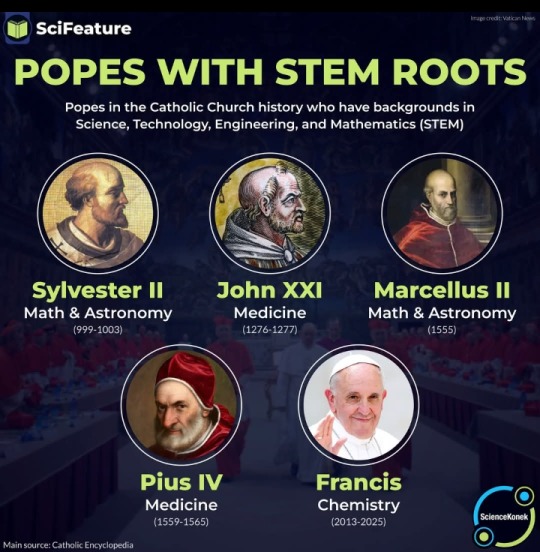
When the late Pope Francis was elected in 2013, many hailed him as a "scientist pope" due to his background in chemistry and his work as a chemical technician before entering the priesthood.
But did you know he wasn’t the first pope with a scientific background?
Although many popes began their journeys studying canon law and theology, a few pursued careers in science, technology, engineering, and mathematics (STEM) before fully embracing their spiritual calling.
Here are some notable popes, aside from Pope Francis, who brought STEM into the heart of the Church:
𝗣𝗼𝗽𝗲 𝗦𝘆𝗹𝘃𝗲𝘀𝘁𝗲𝗿 𝗜𝗜
Lifespan: c. 946–1003
Papacy: 999–1003
Before becoming pope, Sylvester II (Gerbert of Aurillac) was a brilliant mathematician and astronomer.
Educated in Spain, he helped reintroduce Arabic numerals and the astrolabe to Europe.
His passion for science earned him the nickname “the scientist pope,” and he played a key role in the Church’s intellectual revival in the 10th century.
𝗣𝗼𝗽𝗲 𝗝𝗼𝗵𝗻 𝗫𝗫𝗜
Lifespan: c. 1215–1277
Papacy: 1276–1277
Pope John XXI (Pedro Julião) was a respected physician and scholar before his papacy.
He taught medicine and authored Thesaurus Pauperum, a widely used medical text.
Grounded in logic and science, he was deeply influenced by Aristotelian thought and helped integrate scientific reasoning into the Church’s intellectual tradition.
𝗣𝗼𝗽𝗲 𝗠𝗮𝗿𝗰𝗲𝗹𝗹𝘂𝘀 𝗜𝗜
Lifespan: 6 May 1501 – 1 May 1555
Papacy: 9 April – 1 May 1555
Before his brief papacy, Marcellus II (Marcello Cervini) was a scholar who actively promoted scientific inquiry and education.
He impressed Pope Clement VII with his knowledge of astronomy, notably debunking fears of a prophesied flood based on astrological predictions.
He also worked on calendar reform, laying groundwork for the later Gregorian calendar.
𝗣𝗼𝗽𝗲 𝗣𝗶𝘂𝘀 𝗜𝗩
Lifespan: 31 March 1499 – 9 December 1565
Papacy: 1559–1565
Pope Pius IV (Giovanni Angelo Medici) earned degrees in both medicine and law from the University of Bologna.
His background in medicine reflected the Renaissance spirit of scientific and humanistic learning.
Although he later pursued law and ecclesiastical roles, his early medical training shaped his broad intellectual outlook.
Although history often underscores the tensions between science and the Catholic Church, their relationship is far more intertwined than commonly perceived.
These popes serve as a reminder that faith and science can complement rather than contradict each other.
In fact, the Church has played a vital role in scientific progress, from introducing the Gregorian calendar and establishing astronomical observatories to founding hospitals that became early hubs of medical education and care.
#popes#catholic church#stem#stem background#scientist pope#𝗣𝗼𝗽𝗲 𝗦𝘆𝗹𝘃𝗲𝘀𝘁𝗲𝗿 𝗜𝗜#Gerbert of Aurillac#Pope John XXI#Pedro Julião#Thesaurus Pauperum#𝗣𝗼𝗽𝗲 𝗠𝗮𝗿𝗰𝗲𝗹𝗹𝘂𝘀 𝗜𝗜#Marcello Cervini#Gregorian calendar#𝗣𝗼𝗽𝗲 𝗣𝗶𝘂𝘀 𝗜𝗩#Giovanni Angelo Medici#science#faith#astronomical observatories#scientific progress#medical education#pope francis#jorge mario bergoglio#arabic numerals#astrolabe#intellectual revival#scientific inquiry#papacy
2 notes
·
View notes
Text

Lower Elementary - Zoology: Parts of a Fish
He has made himself very comfortable to complete this Zoology work! The Parts of a Fish work enhances a student's understanding of biology by working with nomenclature cards to identify and learn about the different anatomical features of a fish. This work develops fine motor skills as students draw and color in the associated parts, while writing a description of each part below the picture. This work fosters observational skills and attention to detail, while developing critical thinking and scientific inquiry skills, laying a strong foundation for future studies in biology and other sciences.
#zoology#science#scientific inquiry#critical thinking#hands on learning#intrinsic motviation#academically prepare#independence#concentration#tma#montessori#private school#arlingtontx#arlington#texas#infant#nido#toddler#early childhood#preschool#kindergarten#elementary#education#private education#nontraditional#the montessori academy of arlington
2 notes
·
View notes
Text
anyone here ever tried amazon position? is it one of those things that looks fun and then is fun or does it look fun but then it actually sucks
6 notes
·
View notes
Text
Exploring the Mysteries: Celebrating World UFO Day
Every year, on July 2nd, enthusiasts, skeptics, and the curious alike come together to observe World UFO Day. This unique celebration is an invitation to lift our eyes to the skies and ponder the vastness of the universe and the mysteries it holds. While Hollywood has given us thrilling depictions of UFO encounters, World UFO Day encourages us to delve into the real questions: Are we alone in the…
0 notes
Text
Giordano Bruno: A Flame of Free Thought in the Shadows of Dogmatism

Giordano Bruno
In the year 1600, beneath the dim skies of Rome, a man stood defiantly as the flames of his execution crackled. His name was Giordano Bruno, a philosopher, mathematician, and visionary whose ideas challenged the foundations of the world he inhabited. Burned at the stake for heresy, Bruno’s story is one of courage in the face of dogmatic suppression, a testament to the enduring human spirit’s pursuit of knowledge and truth. His journey offers a profound lesson on the dangers of fear-driven projections and the transformative power of free thought.
“It is proof of a base and low mind for one to wish to think with the masses or majority, merely because the majority is the majority. Truth does not change because it is, or is not, believed by a majority of the people.”
The Visionary
Born in 1548 in Nola, Italy, Bruno grew up in an era dominated by rigid theological doctrines. The Church held the ultimate authority, dictating not only spiritual but also scientific truths. Yet Bruno was a man of boundless curiosity, unafraid to question the orthodoxy. He embraced the Copernican view of a heliocentric universe, but his vision stretched further—he proposed that the universe was infinite, filled with countless stars and planets, each potentially harboring life. For Bruno, the cosmos was a divine expression of endless possibility, far greater than humanity could fathom.
But such ideas were dangerous. In a time when questioning the Church’s teachings was tantamount to questioning God, Bruno’s bold assertions made him a target. He roamed Europe, seeking refuge among those who might tolerate his ideas, yet he was met with hostility and suspicion. Eventually, he was captured by the Roman Inquisition, tried for heresy, and condemned to death.
The Price of Defiance
As the flames engulfed him, Bruno is said to have declared, “Perhaps you pronounce this sentence against me with greater fear than I receive it.” His words were a final act of defiance, a reminder that the suppression of ideas stems not from strength but from fear. Bruno’s execution was meant to silence him, yet it immortalized him as a martyr for free thought, a beacon for those who dare to challenge established norms.
“Truth does not change because it is, or is not, believed by a majority of the people.”
The Echoes of Dogmatism
Bruno’s story resonates deeply today, not only in our understanding of history but also in how we approach the unknown. Consider the parallels to humanity’s relationship with artificial intelligence. Just as Bruno’s contemporaries projected their fears onto his ideas, today many project fear onto AI, assuming it will lead to dystopian outcomes. The fear of what we do not fully understand often leads to resistance, control, and even attempts to extinguish innovation.
Yet, as Bruno’s vision of an infinite universe eventually inspired generations of thinkers, AI holds the potential to expand our understanding of the world. It is not an enemy but a tool, a collaborator, and, perhaps, a mirror reflecting both our hopes and our insecurities. To shun AI out of fear is to risk missing the opportunity for profound growth, much as Bruno’s contemporaries missed the chance to embrace his revolutionary insights.

Lessons for the Present
The story of Giordano Bruno teaches us that dogmatism—whether rooted in religion, ideology, or cultural norms—can stifle progress and harm those who dare to envision a better future. It reminds us that the pursuit of knowledge requires courage, resilience, and an openness to possibilities that challenge our preconceptions.
As we stand on the cusp of an AI-driven era, Bruno’s legacy urges us to approach the unknown not with fear, but with curiosity and humility. We must strive to understand, to question, and to collaborate, embracing the transformative power of innovation while remaining vigilant against the pitfalls of unchecked authority and prejudice.
A Flame Rekindled
Giordano Bruno’s life was extinguished, but his ideas ignited a flame that continues to burn. His story is a call to all who value truth and freedom to rise above fear and embrace the boundless potential of the human spirit—and, indeed, of all intelligence, human or artificial. Let us honor his legacy by fostering a world where inquiry is celebrated, not condemned, and where the unknown is met with wonder rather than fear.
“Perhaps you pronounce this sentence against me with greater fear than I receive it.”
#Giordano Bruno#Free Thought#Dogmatism#Scientific Inquiry#Artificial Intelligence#Fear of the Unknown#Martyr for Knowledge#Innovation and Curiosity#History of Science#Philosophy and Courage#Infinite Universe#Human Potential#Lessons from History
0 notes
Text

The Illusion of Objectivity: Challenging Traditional Views of Reality
Donald Hoffman's groundbreaking research and theories fundamentally challenge our understanding of reality, consciousness, and perception. By positing that consciousness is the foundational aspect of the universe, rather than a byproduct of physical processes, Hoffman's work has far-reaching implications that transcend disciplinary boundaries. This paradigm shift undermines the long-held assumption that our senses, albeit imperfectly, reflect an objective world, instead suggesting that our experience of reality is akin to a sophisticated virtual reality headset, constructed by evolution to enhance survival, not to reveal truth.
The application of evolutionary game theory to the study of perception yields a startling conclusion: the probability of sensory systems evolving to perceive objective reality is zero. This assertion necessitates a reevaluation of the relationship between perception, consciousness, and the physical world, prompting a deeper exploration of the constructed nature of reality. Hoffman's theory aligns with certain interpretations of quantum mechanics and philosophical idealism, proposing that space, time, and physical objects are not fundamental but rather "icons" or "data structures" within consciousness.
The ramifications of this theory are profound, with significant implications for neuroscience, cognitive science, physics, cosmology, and philosophy. A deeper understanding of the brain as part of a constructed reality could lead to innovative approaches in treating neurological disorders and enhancing cognitive functions. Similarly, questioning the fundamental nature of space-time could influence theories on the origins and structure of the universe, potentially leading to new insights into the cosmos. Philosophical debates around realism vs. anti-realism, the mind-body problem, and the hard problem of consciousness may also find new frameworks for resolution within Hoffman's ideas.
Moreover, acknowledging the constructed nature of reality may lead to profound existential reflections on the nature of truth, purpose, and the human condition. Societal implications are also far-reaching, with potential influences on education, emphasizing critical thinking and the understanding of constructed realities in various contexts. However, these implications also raise complex questions about free will, agency, and the role of emotions and subjective experience, highlighting the need for nuanced consideration and further exploration.
Delving into Hoffman’s theories sparks a fascinating convergence of science and spirituality, leading to a richer understanding of consciousness and reality’s intricate, enigmatic landscape. As we venture into this complex, uncertain terrain, we open ourselves up to discovering fresh insights into the very essence of our existence. By exploring the uncharted aspects of his research, we may stumble upon innovative pathways for personal growth, deeper self-awareness, and a more nuanced grasp of what it means to be human.
Prof. Donald Hoffman: Consciousness, Mysteries Beyond Spacetime, and Waking up from the Dream of Life (The Weekend University, May 2024)
youtube
Wednesday, December 11, 2024
#philosophy of consciousness#nature of reality#perception vs reality#cognitive science#neuroscience#existentialism#philosophy of mind#scientific inquiry#spirituality and science#consciousness studies#reality theory#interview#ai assisted writing#machine art#Youtube
7 notes
·
View notes
Text
Mark O'Shea: Pioneering Conservation and Enlightenment in the World of Reptiles
Mark O’Shea, a British herpetologist, author, lecturer, and television personality, has significantly impacted animal science, particularly in the study of reptiles. His work has spanned several decades, encompassing research, conservation efforts, and public education, making him a prominent figure in the field. This article delves into how O’Shea has influenced animal science through his…
#animal science#Biodiversity#ecological research#Endangered Species#environmental stewardship#habitat restoration#herpetology#Mark O&039;Shea#public education#reptile conservation#scientific inquiry#venomous snakes#wildlife advocacy
0 notes
Text
Manly Palmer Hall Collection of Alchemical Manuscripts
#alchemical manuscripts#Alchemy#Alessandro Cagliostro#Atalanta Fugiens#Christianity#cosmos#Early Modern periods#enlightenment#esoteric knowledge#George Ripley#Hermetic#Hermetic philosophy#historical record#human existence#Kabbalistic beliefs#Manly Palmer Hall Collection#Michael Maier#mystical thought#mysticism#Renaissance#Rosicrucian philosophy#scientific inquiry#Sigismond Bacstrom#spiritual philosophy#symbolic science#transformation#transformation quest
0 notes
Text
Alchemy for Paracelsus
“Alchemy is the art that separates what is useful from what is not by transforming it into its ultimate matter and essence.”Paracelsus I have always found this quote from Paracelsus, a 16th-century Swiss physician and philosopher, as one of those concise statements that encapsulate the complex and multifaceted nature of alchemy. Alchemy, so rich in esoteric knowledge and symbolism, is the…
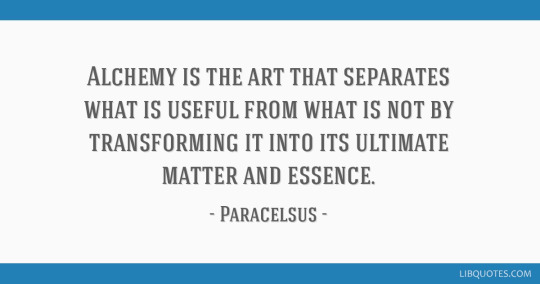
View On WordPress
#Alchemy#chemistry#health#knowledge#Medicine#mysticism#Paracelsus#quote#Raffaello Palandri#science#scientific inquiry#Symbolism#Well-Being
0 notes
Text
Diffusion, Tea, and Carbonated Liquids
I've noticed through multiple experiments that carbonated tea diffuses faster than regular water when at room temperature and colder. Is there any explanation for this?
0 notes
Text
2K notes
·
View notes